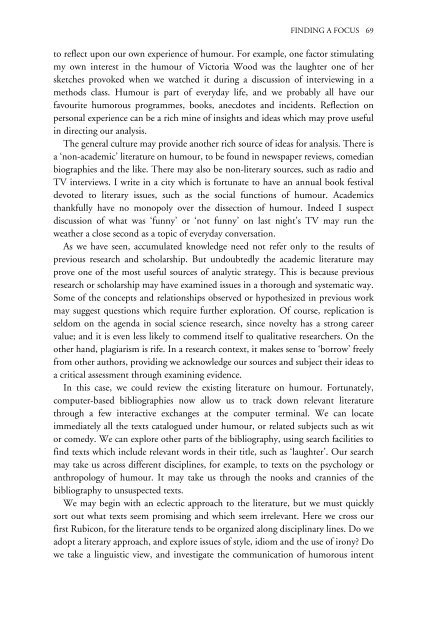Qualitative_data_analysis
Qualitative_data_analysis
Qualitative_data_analysis
Create successful ePaper yourself
Turn your PDF publications into a flip-book with our unique Google optimized e-Paper software.
FINDING A FOCUS 69<br />
to reflect upon our own experience of humour. For example, one factor stimulating<br />
my own interest in the humour of Victoria Wood was the laughter one of her<br />
sketches provoked when we watched it during a discussion of interviewing in a<br />
methods class. Humour is part of everyday life, and we probably all have our<br />
favourite humorous programmes, books, anecdotes and incidents. Reflection on<br />
personal experience can be a rich mine of insights and ideas which may prove useful<br />
in directing our <strong>analysis</strong>.<br />
The general culture may provide another rich source of ideas for <strong>analysis</strong>. There is<br />
a ‘non-academic’ literature on humour, to be found in newspaper reviews, comedian<br />
biographies and the like. There may also be non-literary sources, such as radio and<br />
TV interviews. I write in a city which is fortunate to have an annual book festival<br />
devoted to literary issues, such as the social functions of humour. Academics<br />
thankfully have no monopoly over the dissection of humour. Indeed I suspect<br />
discussion of what was ‘funny’ or ‘not funny’ on last night’s TV may run the<br />
weather a close second as a topic of everyday conversation.<br />
As we have seen, accumulated knowledge need not refer only to the results of<br />
previous research and scholarship. But undoubtedly the academic literature may<br />
prove one of the most useful sources of analytic strategy. This is because previous<br />
research or scholarship may have examined issues in a thorough and systematic way.<br />
Some of the concepts and relationships observed or hypothesized in previous work<br />
may suggest questions which require further exploration. Of course, replication is<br />
seldom on the agenda in social science research, since novelty has a strong career<br />
value; and it is even less likely to commend itself to qualitative researchers. On the<br />
other hand, plagiarism is rife. In a research context, it makes sense to ‘borrow’ freely<br />
from other authors, providing we acknowledge our sources and subject their ideas to<br />
a critical assessment through examining evidence.<br />
In this case, we could review the existing literature on humour. Fortunately,<br />
computer-based bibliographies now allow us to track down relevant literature<br />
through a few interactive exchanges at the computer terminal. We can locate<br />
immediately all the texts catalogued under humour, or related subjects such as wit<br />
or comedy. We can explore other parts of the bibliography, using search facilities to<br />
find texts which include relevant words in their title, such as ‘laughter’. Our search<br />
may take us across different disciplines, for example, to texts on the psychology or<br />
anthropology of humour. It may take us through the nooks and crannies of the<br />
bibliography to unsuspected texts.<br />
We may begin with an eclectic approach to the literature, but we must quickly<br />
sort out what texts seem promising and which seem irrelevant. Here we cross our<br />
first Rubicon, for the literature tends to be organized along disciplinary lines. Do we<br />
adopt a literary approach, and explore issues of style, idiom and the use of irony? Do<br />
we take a linguistic view, and investigate the communication of humorous intent



